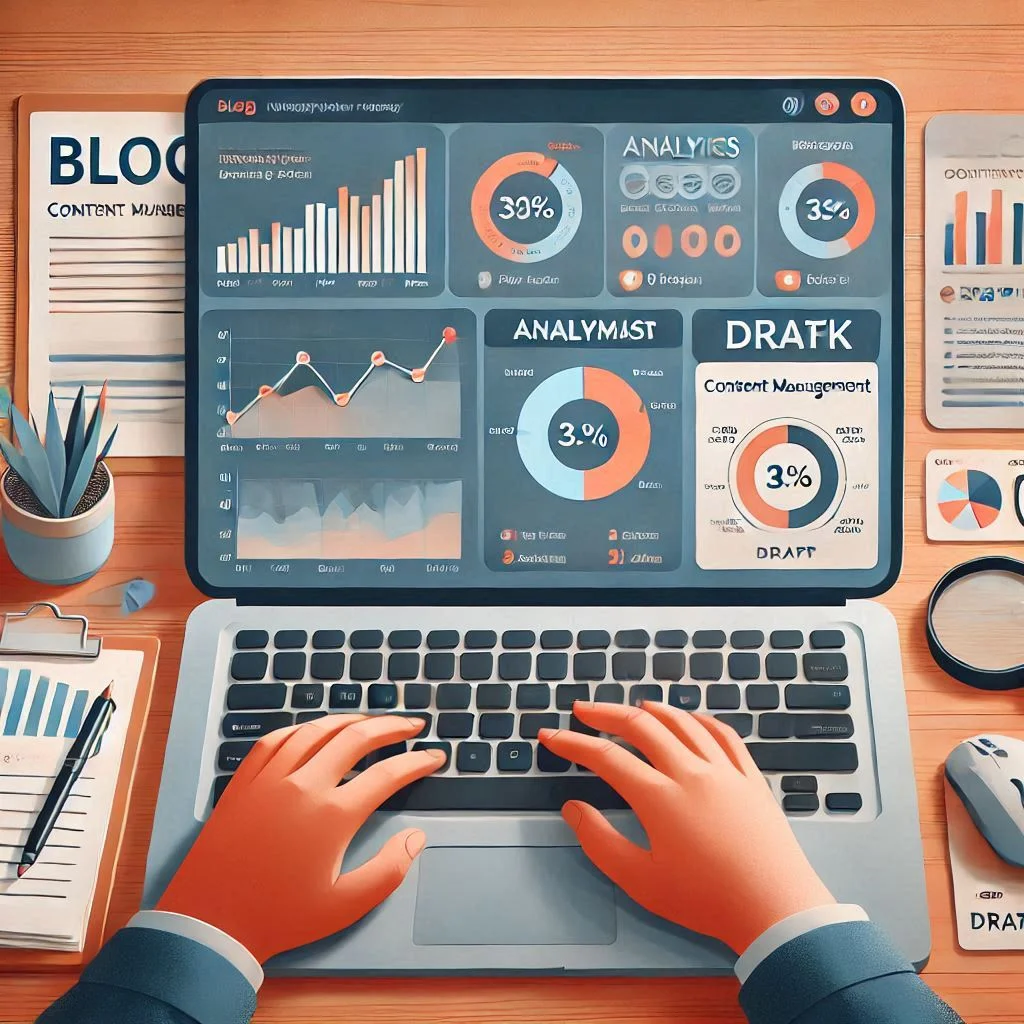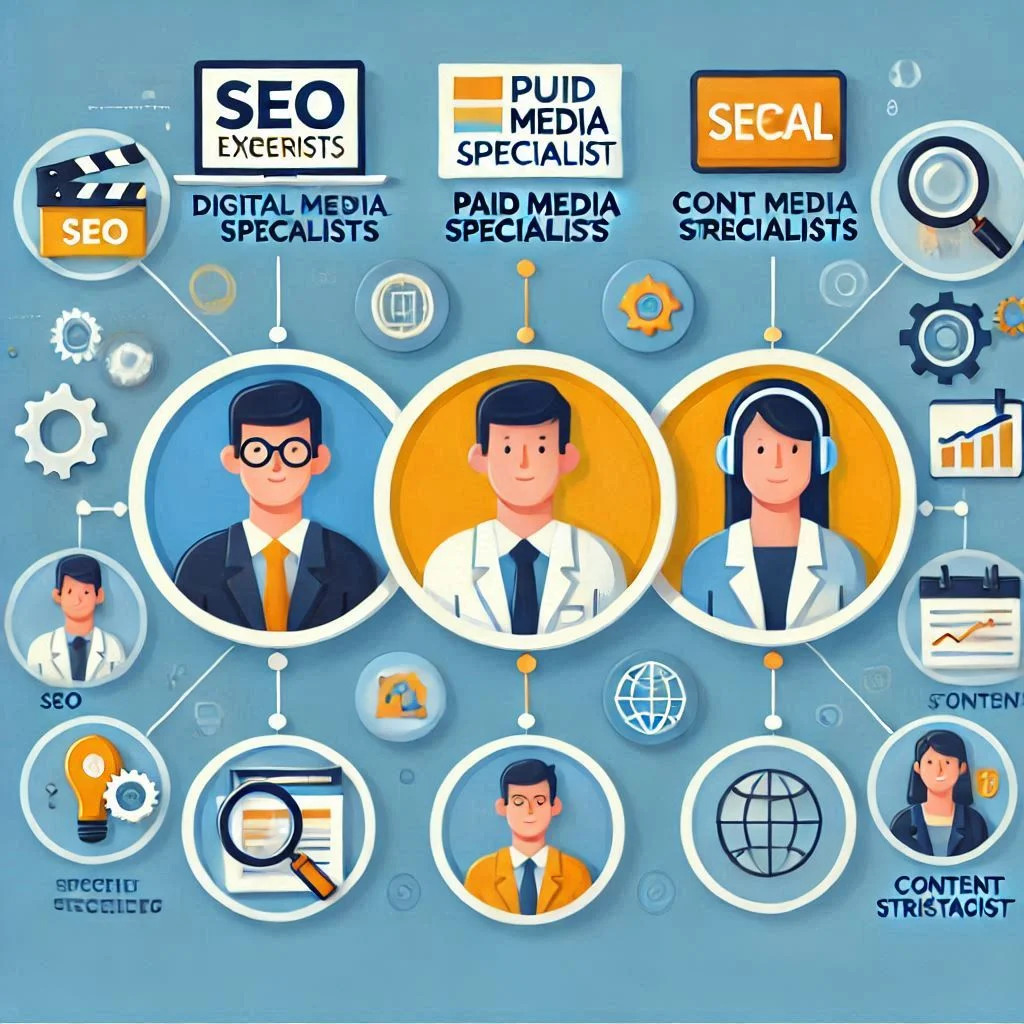Today we will discover what is digital marketing job and responsibilities. Digital marketing is the practice of promoting products, services, or brands through digital channels such as search engines, websites, social media, email, and mobile apps. It leverages online platforms and tools to reach and engage target audiences effectively. Unlike traditional marketing, digital marketing provides measurable results and allows businesses to adjust strategies in real time based on data insights.
Key components of digital marketing include:
- Search Engine Optimization (SEO): Enhancing website visibility in search engine results.
- Content Marketing: Creating valuable content to attract and retain an audience.
- Social Media Marketing: Using platforms like Instagram, Facebook, and LinkedIn to build a brand presence.
- Email Marketing: Sending personalized messages to nurture leads and retain customers.
- Pay-Per-Click (PPC) Advertising: Driving traffic through paid ads on platforms like Google Ads.
- Affiliate Marketing: Partnering with affiliates to promote products and earn commissions.
Digital marketing jobs involve promoting brands, products, or services through digital channels such as websites, social media platforms, email, search engines, and more. It combines creativity, data analysis, and technical skills to reach and engage audiences effectively. Digital marketers play a pivotal role in designing and implementing campaigns that drive business growth in an increasingly digital world.
Digital Marketing Job Roles and Responsibilities
Planning and Executing Digital Marketing Campaigns
Digital marketers are responsible for designing strategies tailored to business objectives, target audiences, and market trends. This involves:
- Setting clear campaign goals (e.g., brand awareness, lead generation, sales conversions).
- Budget allocation for advertising across digital platforms.
- Designing creative assets like banners, videos, and ad copy.
- Coordinating campaigns across multiple platforms like Google Ads, Facebook Ads, and email marketing.

Generating Blog and Content Strategies
Content creation is central to digital marketing. Responsibilities include:
- Writing blog posts optimized with SEO-friendly keywords.
- Developing engaging formats like videos, infographics, and podcasts.
- Establishing a content calendar for consistent posting.
- Ensuring all content aligns with the brand’s tone and audience preferences.

Identifying Trends and Market Insights
A successful digital marketer must stay updated with the latest industry trends. This involves:
- Conducting competitor analysis.
- Monitoring changes in consumer behavior and preferences.
- Leveraging tools like Google Trends, social listening platforms, and industry reports.
- Adjusting marketing strategies based on data insights.

Collaborating with Marketing Teams
Collaboration ensures cohesive campaigns across various channels. Tasks include:
- Coordinating with graphic designers, content creators, and developers.
- Communicating campaign goals and brand messaging effectively.
- Sharing feedback and optimizing performance as a team.
Understanding and Applying Social Media Best Practices
Social media management is a vital aspect of digital marketing, requiring expertise in:
- Crafting platform-specific content (e.g., Instagram visuals, Twitter threads).
- Leveraging algorithms for maximum reach.
- Engaging with followers through comments, DMs, and polls.
- Using tools like Hootsuite to schedule and track posts.
Analyzing Campaign Performance
Performance analysis helps measure the success of campaigns and guide future decisions. Key actions include:
- Tracking metrics like CTR (Click-Through Rate), impressions, and conversions.
- Creating detailed reports using tools like Google Analytics or HubSpot.
- Identifying areas for improvement and A/B testing strategies.
Building Brand Awareness
Building a recognizable and trusted brand involves:
- Running awareness campaigns through display ads and sponsored content.
- Partnering with influencers or industry thought leaders.
- Consistently delivering value through educational or entertaining content.
Data Analysis and Goal Setting
Data-driven decisions are at the core of successful digital marketing strategies:
- Analyzing historical data to set realistic goals.
- Tracking KPIs (Key Performance Indicators) like ROI and CPA (Cost Per Acquisition).
- Utilizing dashboards to visualize data and trends.
Paid Search and Social Media Advertising
Marketers often manage paid campaigns to reach targeted audiences. Responsibilities include:
- Setting up Google Ads and social media ads.
- Optimizing campaigns to maximize ROI.
- Segmenting audiences for personalized ad delivery.
- Monitoring ad performance and making real-time adjustments.
Essential Skills for Digital Marketing Jobs
Digital marketing is a field that demands a mix of technical expertise and creative flair. Professionals aspiring to excel in this area need to possess both hard and soft skills to drive successful campaigns, optimize performance, and engage audiences effectively.
Hard Skills
1. Email Marketing
Email marketing remains a cornerstone of digital marketing strategies, enabling businesses to communicate directly with customers.
- Key Tasks: Creating email campaigns, designing templates, segmenting audiences, and analyzing metrics like open and click-through rates.
- Tools: Platforms like Mailchimp, HubSpot, and ActiveCampaign streamline email campaign management.
- Importance: Personalization and automation in email marketing increase ROI and foster customer loyalty.

2. Social Media Management
Social media is a powerful channel for brand visibility, audience engagement, and lead generation.
- Key Tasks: Crafting posts, scheduling content, responding to comments, and monitoring performance metrics.
- Tools: Tools like Hootsuite, Buffer, and Sprout Social help manage multiple accounts efficiently.
- Importance: Effective social media management builds brand loyalty and drives traffic to websites.

3. SEO and Content Marketing
SEO and content marketing work hand-in-hand to enhance online visibility and attract organic traffic.
- Key Tasks: Researching keywords, optimizing on-page and off-page SEO, and producing high-quality, relevant content.
- Tools: SEMrush, Ahrefs, and Yoast SEO assist in keyword analysis and content optimization.
- Importance: SEO strategies ensure that content ranks high on search engines, increasing brand credibility and reach.

4. Copywriting and Content Creation
Copywriting and content creation are fundamental for engaging audiences and delivering brand messages effectively.
- Key Tasks: Writing compelling ad copies, crafting blog posts, creating video scripts, and producing infographics.
- Tools: Grammarly, Canva, and Adobe Creative Suite aid in content creation and refinement.
- Importance: Engaging content captures attention, drives traffic, and influences purchase decisions.
5. PPC and Paid Media Management
PPC advertising is vital for driving targeted traffic through paid campaigns on search engines and social media.
- Key Tasks: Setting up ad campaigns, managing budgets, and analyzing ad performance metrics.
- Tools: Google Ads, Facebook Ads Manager, and Microsoft Advertising provide precise control over ad spend.
- Importance: Paid campaigns ensure quick visibility and help capture leads in competitive markets.
6. Web Design and CRO (Conversion Rate Optimization)
Web design and CRO focus on creating user-friendly experiences that convert visitors into customers.
- Key Tasks: Designing landing pages, improving user experience, and A/B testing to identify effective design elements.
- Tools: Figma, Adobe XD, and Unbounce are used for web design, while Google Optimize and Optimizely support CRO efforts.
- Importance: A well-designed website with optimized conversion rates maximizes ROI and supports business goals.

Experience Levels in Digital Marketing Jobs
The digital marketing field offers diverse roles tailored to varying levels of experience. From entry-level beginners to seasoned professionals, each stage requires distinct skills, responsibilities, and opportunities for growth. Here’s a breakdown of the roles based on experience levels:
Entry-Level Roles
Entry-level roles are the starting point for fresh graduates or individuals transitioning into digital marketing.
- Key Responsibilities:
- Managing social media accounts.
- Assisting in content creation (blogs, posts, graphics).
- Conducting keyword research for SEO strategies.
- Running basic PPC campaigns under guidance.
- Monitoring campaign analytics and generating reports.
- Skills Required:
- Basic knowledge of marketing tools like Google Analytics, Canva, or Hootsuite.
- Strong written and verbal communication skills.
- A foundational understanding of SEO and social media platforms.
- Job Titles:
- Digital Marketing Assistant
- Social Media Coordinator
- Content Marketing Intern

Mid-Level Roles
Mid-level roles are for professionals with 2–5 years of experience in the field, possessing deeper insights and taking ownership of marketing initiatives.
- Key Responsibilities:
- Designing and executing integrated digital marketing campaigns.
- Managing multiple channels, including email, social media, and PPC.
- Optimizing SEO strategies and implementing advanced techniques.
- Supervising junior team members and coordinating cross-functional teams.
- Budget planning and ROI analysis for campaigns.
- Skills Required:
- Proficiency in tools like SEMrush, HubSpot, and Google Ads.
- Strong project management and data analysis capabilities.
- Creative problem-solving and adaptability to changing trends.
- Job Titles:
- Digital Marketing Specialist
- SEO Analyst
- Paid Media Manager

Senior-Level Roles
Senior-level roles demand strategic thinking, leadership abilities, and a proven track record of successful campaigns. These professionals guide the digital marketing vision of the organization.
- Key Responsibilities:
- Developing and leading comprehensive digital marketing strategies.
- Driving innovation by identifying new tools and methodologies.
- Overseeing a team of marketers and ensuring alignment with business goals.
- Analyzing market trends and competitor activities to stay ahead.
- Ensuring brand consistency across all digital platforms.
- Skills Required:
- Expertise in advanced analytics tools, automation platforms, and CRM systems.
- Exceptional leadership and communication skills.
- Advanced understanding of user behavior and market dynamics.
- Job Titles:
- Digital Marketing Manager
- Marketing Director
- Chief Marketing Officer (CMO)

Career Development Opportunities for Digital Marketers
Digital marketing is a dynamic field requiring professionals to constantly upgrade their skills to stay competitive. Below are key avenues for career growth and skill enhancement for digital marketers.
Earning Industry Certifications
Certifications from reputed platforms validate your expertise and make your resume stand out. They demonstrate your proficiency in specific areas of digital marketing and can lead to higher-paying roles.
Popular Certifications Include:
- Google Ads Certification: Teaches paid search advertising on Google’s platform.
- HubSpot Inbound Marketing Certification: Focuses on inbound strategies like SEO, blogging, and content marketing.
- Meta Blueprint Certification: Validates expertise in Facebook and Instagram advertising.
Key Benefits:
- Enhances job prospects and credibility.
- Provides specialized skills relevant to current industry demands.

Attending Online Courses and Workshops
Online courses offer flexibility and access to top instructors globally. Workshops provide practical, hands-on experiences that reinforce learning.
Recommended Platforms:
- Coursera: Offers courses from universities and institutions worldwide.
- Udemy: Affordable courses on SEO, content marketing, and more.
- LinkedIn Learning: Focuses on both hard and soft skills.
Key Insights:
- Gain in-demand skills like SEO optimization, email marketing, and campaign analysis.
- Learn at your own pace with flexible deadlines.

Joining Conferences and Networking Events
Conferences and events are excellent for building connections and staying updated with industry trends.
Notable Events:
- Digital Summit Series: Covers the latest in digital marketing, UX, and design.
- Social Media Marketing World: Focuses on social media strategies.
- Content Marketing World: Dives deep into content creation and distribution.
Why Attend?:
- Learn from industry leaders through keynotes and workshops.
- Network with peers, potential employers, and collaborators.
Leveraging Professional Associations
Professional associations provide resources, training, and networking opportunities. Joining these organizations helps marketers stay informed and connected.
Top Associations:
- American Marketing Association (AMA): Offers resources, certifications, and local networking events.
- Interactive Advertising Bureau (IAB): Focuses on data-driven marketing practices.
Membership Perks:
- Access to exclusive industry reports and job boards.
- Opportunities to collaborate on research and projects.

Learning from Blogs, Podcasts, and Case Studies
Regularly consuming industry content helps marketers stay updated on best practices and trends.
Top Resources:
- Neil Patel’s Blog: Covers SEO, content marketing, and more.
- HubSpot Blog: Offers insights into inbound marketing and CRM.
- Podcasts: Marketing Over Coffee and Online Marketing Made Easy.
Why It Matters:
- Stay informed about algorithm changes and emerging tools.
- Learn actionable tips from case studies and real-world examples.
Practicing with Hands-On Projects
Nothing beats learning by doing. Hands-on projects allow marketers to apply theories and understand tools like Google Analytics and Canva practically.
How to Start:
- Create a personal blog and focus on SEO strategies.
- Volunteer for freelance projects to gain diverse experience.
- Analyze competitors’ strategies and replicate their success.
Why This Works:
- Builds confidence in applying digital marketing skills.
- Provides a portfolio to showcase to potential employers or clients.
Employment Opportunities in Digital Marketing
Digital marketing offers a wide array of career opportunities due to its increasing importance across industries. Below, we explore the various avenues and roles that digital marketers can pursue.
Demand Across Diverse Industries
Digital marketing is a versatile field that applies to virtually every industry. Businesses, regardless of size or niche, rely on digital marketing to reach their target audience effectively.
Industries in High Demand:
- E-Commerce: Drives online sales through targeted campaigns and personalized recommendations.
- Healthcare: Promotes services and builds trust through educational content and SEO strategies.
- Real Estate: Generates leads with email campaigns and virtual tours.
- Entertainment: Boosts visibility through social media and influencer partnerships.
Key Insight:
The shift towards digital-first marketing strategies ensures ongoing demand for skilled professionals in multiple sectors.

Remote Work and Flexible Opportunities
The digital nature of the field enables professionals to work from anywhere, making remote work a common arrangement.
Advantages of Remote Roles:
- Greater work-life balance.
- Access to global opportunities without relocation.
- Cost savings on commuting and living expenses.
Common Remote Positions:
- Social Media Manager
- SEO Specialist
- Email Marketing Strategist
Key Insight:
Remote roles also offer flexibility in working hours, making digital marketing an attractive career for individuals seeking non-traditional work environments.

Freelance and Consulting Roles
Many digital marketers choose freelancing or consulting to enjoy flexibility and autonomy in their careers.
Freelance Opportunities:
- Content creation for blogs and websites.
- PPC campaign management for small businesses.
- Graphic design and branding services.
Benefits of Freelancing:
- Set your rates and choose your projects.
- Work with diverse clients, gaining exposure to various industries.
- Scale your business into a full-fledged agency over time.
Consulting Roles:
Digital marketing consultants help businesses improve their online presence by offering strategic insights and actionable plans.
Specialized Career Paths in Digital Marketing
As the field evolves, specialized roles are emerging, allowing professionals to focus on specific areas of interest.
Key Specializations:
- SEO Expert: Drives organic traffic through optimization techniques.
- Paid Media Specialist: Manages PPC campaigns to maximize ROI.
- Social Media Strategist: Crafts engaging campaigns for platforms like Instagram and TikTok.
- Email Marketing Specialist: Builds effective newsletters and drip campaigns.
- Content Strategist: Focuses on planning and executing long-term content goals.
Key Insight:
Specialized roles often command higher salaries and offer clearer paths for career advancement.

Common Challenges in Digital Marketing Jobs
While digital marketing offers diverse opportunities, it also comes with a set of challenges that professionals must navigate to succeed. Below, we break down the most common hurdles and strategies to overcome them.
Keeping Up with Changing Technology and Trends
The digital landscape is constantly evolving, with new tools, platforms, and strategies emerging regularly.
Challenges:
- Staying informed about the latest updates, such as AI tools or marketing platforms.
- Adapting campaigns to incorporate innovative trends like voice search or augmented reality.
- Learning how to use new analytics or automation tools efficiently.
Solution:
- Dedicate time to continuous learning through webinars, certifications, and industry blogs.
- Subscribe to newsletters from authoritative marketing sources like HubSpot, SEMrush, and Google.

Balancing Creativity with Data-driven Approaches
Digital marketing success requires a fine balance between innovative ideas and measurable results.
Challenges:
- Over-reliance on data might stifle creativity, while excessive creativity might ignore ROI.
- Crafting campaigns that resonate emotionally while meeting analytical benchmarks.
Solution:
- Use A/B testing to experiment with creative elements while analyzing what works best.
- Collaborate with analytics teams to interpret data and adjust campaigns accordingly.
Key Insight:
Data and creativity should complement each other to achieve impactful campaigns.

Navigating Algorithm Changes and Compliance
Algorithms on platforms like Google, Facebook, and Instagram are frequently updated, impacting campaign visibility and performance.
Challenges:
- Sudden algorithm changes can derail well-planned campaigns.
- Complying with data privacy regulations like GDPR and CCPA.
Solution:
- Stay informed through official updates from platforms.
- Develop adaptable strategies that align with algorithm changes, such as prioritizing high-quality, user-focused content.
- Regularly audit campaigns to ensure compliance with legal standards.

Measuring ROI and Attribution
Determining the true impact of marketing efforts can be complex, especially when multiple channels are involved.
Challenges:
- Assigning credit to the right marketing efforts in multi-touchpoint customer journeys.
- Justifying marketing budgets with accurate ROI metrics.
Solution:
- Use advanced analytics tools like Google Analytics 4 or HubSpot for better attribution modeling.
- Implement clear KPIs (Key Performance Indicators) for each campaign and regularly review them.
Key Insight:
Attribution models like first-click, last-click, and linear attribution help understand campaign contributions better.
Managing Content Saturation and Quality Standards
With the massive volume of content published daily, standing out has become more difficult than ever.
Challenges:
- Competing with an overwhelming amount of content on social media, blogs, and ads.
- Maintaining high-quality standards while producing content at scale.
Solution:
- Focus on creating niche-specific, valuable, and engaging content.
- Invest in tools like Grammarly, Canva, and video editing software to enhance content quality.
- Prioritize storytelling and authenticity to resonate with your audience.
Key Insight:
High-quality, unique content not only attracts but retains the audience’s attention.

Tools Used in Digital Marketing Jobs
Digital marketers rely on a suite of specialized tools to streamline tasks, enhance productivity, and deliver measurable results. Below, we explore essential tools across analytics, SEO, social media management, and email marketing.
Analytics Tools (e.g., Google Analytics, HubSpot)
Analytics tools are the backbone of digital marketing, enabling professionals to measure performance and gain insights.
Key Features and Benefits:
- Google Analytics: Tracks website traffic, user behavior, and conversion rates. It provides actionable insights through data visualization tools and custom reports.
- HubSpot: Combines analytics with CRM capabilities, offering detailed insights into customer journeys, campaign ROI, and lead tracking.
Use Case:
Marketers can monitor which channels drive the most traffic, identify audience demographics, and optimize campaigns for better results.
Pro Tip: Regularly analyze bounce rates and session durations to improve user experience and content relevance.

SEO Tools (e.g., SEMrush, Ahrefs)
Search Engine Optimization (SEO) tools help improve online visibility by optimizing websites and content for search engines.
Key Features and Benefits:
- SEMrush: Offers features for keyword research, competitor analysis, and site audits, helping marketers identify opportunities to rank higher.
- Ahrefs: Specializes in backlink analysis, content gap identification, and detailed keyword metrics to boost organic traffic.
Use Case:
A digital marketer can track target keywords, discover competitor strategies, and fine-tune website SEO for better rankings.
Pro Tip: Focus on long-tail keywords and create topic clusters for improved relevance and authority.

Social Media Management Tools (e.g., Hootsuite, Buffer)
Social media tools are vital for planning, scheduling, and monitoring campaigns across platforms.
Key Features and Benefits:
- Hootsuite: Allows scheduling posts, tracking mentions, and engaging with followers in real-time on multiple platforms.
- Buffer: Provides analytics for social media posts and streamlines publishing with a user-friendly interface.
Use Case:
Marketers can plan content calendars, monitor engagement metrics, and ensure consistent posting schedules to maximize reach and engagement.
Pro Tip: Use the analytics features in these tools to determine the best times for posting on each platform.

Email Marketing Platforms (e.g., Mailchimp, ActiveCampaign)
Email marketing tools are indispensable for creating, automating, and analyzing email campaigns.
Key Features and Benefits:
- Mailchimp: Offers templates for designing newsletters, automation for drip campaigns, and analytics to track open and click-through rates.
- ActiveCampaign: Combines email marketing with CRM and automation workflows, enabling personalized communication and lead nurturing.
Use Case:
Businesses can send segmented email campaigns tailored to different audience personas, increasing engagement and conversion rates.
Pro Tip: Use A/B testing to optimize subject lines, email content, and call-to-action (CTA) placements.

FAQs About Digital Marketing Jobs
Digital marketing is a dynamic and ever-evolving field that offers numerous opportunities for professionals at different stages of their careers. Below, we address common questions about digital marketing jobs, providing insights into the roles, expectations, and growth prospects within this field.
1. What does a digital marketer do daily?
A digital marketer’s daily tasks can vary depending on their role and the needs of their organization. However, the following activities are commonly included:
- Campaign Planning and Execution: Developing and launching digital marketing campaigns across various platforms, such as social media, email, and search engines.
- Content Creation and Management: Writing blog posts, designing infographics, or creating video content for targeted audiences.
- Data Analysis: Monitoring and analyzing key performance metrics using tools like Google Analytics and social media analytics to optimize campaigns.
- SEO and Keyword Research: Conducting keyword research and optimizing website content for better search engine rankings.
- Community Engagement: Responding to comments, interacting with followers, and managing online communities to maintain brand presence.
- Collaboration: Coordinating with team members, graphic designers, and project managers to meet deadlines and goals.

2. What is the average salary for digital marketing jobs?
The average salary for digital marketing jobs varies widely depending on the role, location, and level of experience. On average:
- Entry-Level Positions: Digital marketing assistants or coordinators typically start with a salary range of $35,000 to $50,000 annually.
- Mid-Level Roles: Digital marketing specialists and managers can expect to earn between $50,000 and $75,000 annually.
- Senior-Level Positions: Senior digital marketers or directors can command salaries ranging from $75,000 to over $100,000 annually, with some positions reaching well beyond this range, especially in tech hubs or large corporations.

3. Is digital marketing a good career choice?
Yes, digital marketing is an excellent career choice for those who enjoy creativity, data analysis, and strategic thinking. Here are some reasons why digital marketing stands out:
- High Demand: As more businesses shift to online platforms, the demand for skilled digital marketers continues to grow.
- Diverse Career Paths: From social media management and SEO specialists to content strategists and paid media managers, there are numerous paths to explore.
- Opportunities for Creativity and Innovation: Digital marketing allows for creative expression through campaigns, social media strategies, and content development.
- Flexibility and Remote Work: Many digital marketing roles offer remote work options and flexible schedules, providing better work-life balance.

4. How can I grow my email list as a digital marketer?
Growing an email list is a crucial part of digital marketing that helps nurture leads and boost conversions. Here are effective strategies:
- Offer Lead Magnets: Provide valuable resources such as eBooks, whitepapers, or free courses in exchange for email subscriptions.
- Optimize Landing Pages: Create high-converting landing pages with clear CTAs and minimal distractions.
- Use Pop-Ups and Slide-Ins: Strategically place pop-ups or slide-in forms on your website to capture leads without disrupting user experience.
- Host Webinars and Workshops: Encourage sign-ups by offering live sessions that provide valuable insights.
- Engage with Social Media: Promote email sign-ups through targeted social media campaigns.
- Leverage Referral Programs: Offer incentives for current subscribers to refer friends and colleagues.

Conclusion: Why Digital Marketing is a Great Career
Digital marketing is a thriving field that continues to expand as technology advances and businesses prioritize online presence. It offers a wealth of opportunities for growth, creativity, and professional development. From planning and executing campaigns to leveraging powerful analytics tools and collaborating with diverse teams, the roles in digital marketing are varied and rewarding.
With essential skills like SEO, content creation, and data analysis, digital marketers can position themselves for success and stay ahead in this competitive field. The growing demand, high earning potential, and flexibility make digital marketing an appealing career choice for aspiring professionals.
Whether you’re just starting or looking to advance your career, the dynamic world of digital marketing offers the chance to make an impact, constantly learn, and innovate in an ever-evolving landscape. Embrace the opportunity to build a career that combines strategy, creativity, and continuous growth.


